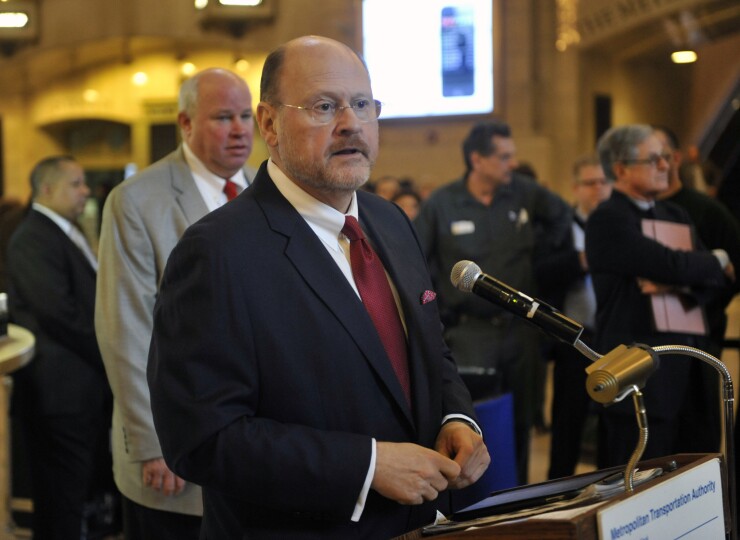As an old sore -- the lack of reliable revenue sources -- festers, the board of New York's Metropolitan Transportation Authority on Wednesday approved a $16.2 billion
Dynamics include chronic subway breakdowns and overcrowding, political volatility in Washington and Albany, fractious state-city relations and intensified criticism from watchdogs and think tanks wanting the MTA to improve from within.
The four appointees of Mayor Bill de Blasio on the 17-member board voted against the plan, citing concerns about how reduced funding from the federal and state governments could affect the so-called subway action plan, a triage initiative Chairman Joseph Lhota announced in July after Gov. Andrew Cuomo declared a state of emergency for New York City's transit system.

"The one thing we at the board agreed on was the need for additional funding for the MTA, both operating and capital," Lhota told reporters after a spirited meeting.
Lhota said a shortage of funds would force the authority to space out the necessary work over time.
Both Lhota and Cuomo want the city to kick in half of the roughly $800 first-phase triage cost, saying the alternative is to scale back on some of the work.De Blasio has balked.
"I don't agree with the contention that the subway action plan will be the only thing on the chopping block," said board member and city transportation commissioner Polly Trottenberg, who said the MTA should consider other options. "We're voting on this budget when the city, state and federal situation is very much uncertain."
The MTA is one of the largest municipal issuers with roughly $39 billion of debt.
Any federal tax-overhaul bill that ultimately passes could strip the MTA of advance refundings, an option its finance officials have used often. That could affect the authority's finances downstream.
Congestion pricing could surface in January when the state General Assembly reconvenes in Albany. Cuomo has begun to warm up to a form of plan that would call for tolls on vehicles entering Manhattan south of 60th Street, toll now-free East River bridges and reduce tolls on other outer-borough crossings.
"I think we'll fully hear the governor talk about it in January," said Lhota, who considers congestion pricing "absolutely" necessary.
"There has been congestion pricing in various different parts of the world. It has worked," he added. "Congestion pricing, I will tell you, does take time to implement. It's not something where you just say 'let's do it.' "
Passage could spare riders from unscheduled fare and toll hikes.
"This time around, the idea of congestion pricing and tolls over the East River bridges has some legs to it," said Howard Cure, the director of municipal bond research for Evercore Wealth Management. "The mayor is against it, so the governor will probably push it even more. They don't see eye to eye."
De Blasio opposes congestion pricing and instead favors a millionaire's tax -- his frequent go-to talking point on many initiatives. That may be a tough sell if the new federal tax bill eliminates the deduction on state taxes.
Other options for the MTA are on the table, Cure added.
"The governor may introduce a form of congestion pricing or some cap and trade. He's big on environmental things.
"The city has used value capture on issues such as Hudson Yards to fund debt needed for the extension of the [No. 7] subway line, so that's also in play."
So, too, is Cuomo's national reputation. With an eye on Washington all the while, the governor has said loudly and often the subway crisis is on him. He declared a state of emergency for the MTA last June.
Nicole Gelinas, a senior fellow at the Manhattan Institute for Policy Research, said mere funding for the MTA is not enough. The authority, she said, must curb labor and procurement costs.
“Cuomo has never shown any interest in work-rules reform or benefits reform," she said.”
A recession could force the MTA to take a hard look in those areas, said Gelinas, but that's still a longshot.
“This hasn’t worked in the past," she said. "They have to cut service or maintenance or things like that.”
Lhota said Wednesday that the authority has commenced working groups, which various board members chair, to examine improvements in such areas as construction costs, procurement overhaul, handicapped accessibility and positive train control, a remote technology system designed to prevent crashes.
The board also rubber-stamped the finance commitee's authorization to finance up to $3 billion in bonds and notes for 2018.





